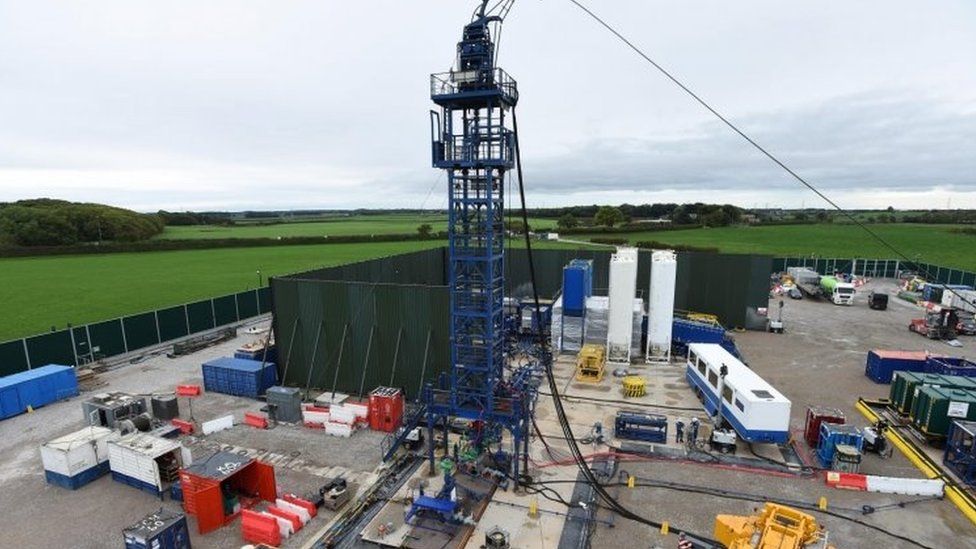Fracking: Tory MPs set to defy Liz Truss in loyalty vote
Three Tory MPs look set to defy the government on fracking, after it declared a vote on banning shale gas extraction a "confidence motion".
Labour wants to use a vote in Parliament to force the introduction of a draft law to ban fracking.
The government has ordered Tory MPs to support its policy, or face expulsion from the parliamentary party.
Ahead of the showdown, three Tory MPs signalled they could not "vote tonight to support fracking".
Former ministers Chris Skidmore, Tracey Crouch, and backbencher Angela Richardson, suggested they would not support the government, meaning they could lose the whip.
In his tweet, Mr Skidmore said he was "prepared to face the consequences of my decision", and Ms Crouch and Ms Richardson both shared his comments with the word "ditto".
However, no other Tory MPs have signalled they would rebel as the Commons debate progressed.
Earlier, Business Secretary Jacob Rees-Mogg said communities would have a "veto" on fracking in their area, as he attempted to quell the rebellion over fracking.
A number of Conservative MPs oppose fracking, but they have been told they must oppose the Labour motion or face expulsion from the parliamentary party.
Ms Truss's press secretary has said the prime minister would not resign even if the government loses Wednesday's vote.
That is because Labour's motion does not amount to a formal vote of no confidence in the government.
Fracking was halted in 2019 following opposition from environmentalists and local concerns over earth tremors linked to the practice.
But last month, the UK government ended the fracking ban in England as part of its plan to limit rising energy costs.
Now Labour says it wants to give MPs a chance to overturn the decision, which broke a 2019 Tory manifesto promise. It will be voted on at 19:00 BST in Parliament.
Some MPs for the Scottish National Party - which opposes fracking - have told the BBC they will take part in the vote.
If Labour's motion is approved, a bill to ban fracking would be given priority to be debated and voted on in Parliament.
In a message to Tory MPs, deputy chief whip Craig Whittaker said the government "cannot, under any circumstances, let the Labour Party take control of the order paper and put through their own legislation".
He said the party was voting "no" on Labour's motion, enforcing what's known as a three-line whip.
"I know this is difficult for some colleagues, but we simply cannot allow this. Please speak with your whip with any issues," the message from Mr Whittaker reads.
When lifting the ban on fracking last month, the government said the practice would resume only where there was local consent, but did not say how this would be sought.
At Prime Minister's Questions, Liz Truss said the government "will consult on the robust system of local consent" and "give clear advice on seismic limits" before any fracking goes ahead.
Business Secretary Jacob Rees-Mogg set out more details during the debate on Labour's fracking motion.
Mr Rees-Mogg said local communities will have a "veto" on fracking after a consultation on community consent, and that national government would be unable to overrule communities objections, with one option under consideration involving local referendums.
"There's an absolute local consent lock," Mr Rees-Mogg said. "Any process to determine local consent must be run independently and this House will vote on any scheme that we bring forward."
The government hopes the Conservative MPs who oppose fracking will back down.
Meanwhile, Labour believes the government is walking into a trap. They want to make this a big dividing line, and have adverts ready attacking each MP who votes against a fracking ban.
One Conservative MP has told the BBC that many will be very unhappy about voting with the government on this issue.
Last week, some Tory MPs told the BBC they were talking to opposition parties about ways they could block the government's fracking plans.
Shadow climate change secretary Ed Miliband said the motion gave Tory MPs a "simple choice" between banning fracking and allowing the government to "impose" the activity on communities.
The Liberal Democrats have urged Tory MPs to "show some backbone" by voting for a ban.
"Conservative MPs will not be forgiven if they give the go-ahead to fracking our countryside for more expensive gas instead of backing renewables," said the party's climate change spokesperson Wera Hobhouse.
A no-confidence vote is usually tabled by the opposition and if the government loses, the prime minister will be expected to resign or ask the King to dissolve Parliament, triggering a general election.
The Tory whips have described Wednesday's vote as "a confidence motion", but the government has the final say over how to respond to a defeat.
Nevertheless, defeat for the government would have political consequences. For example, Tory MPs who do not vote with the government on this motion have been warned they will no longer remain in the parliamentary party.
This could stir up discontent at a time when Ms Truss is trying to shore up her authority.

























